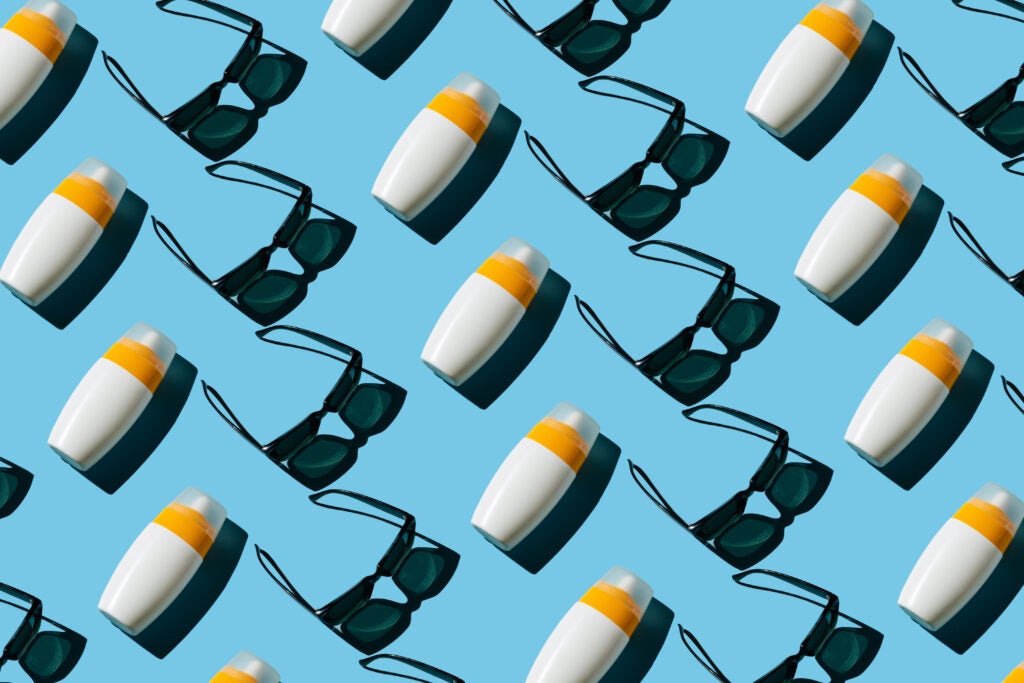Methods to Decide a Face SPF You’ll Love

“], “filter”: { “nextExceptions”: “img, blockquote, div”, “nextContainsExceptions”: “img, blockquote, a.btn, a.o-button”} }”>
Heading out the door? Learn this text on the brand new Exterior+ app accessible now on iOS gadgets for members!
>”,”title”:”in-content-cta”,”kind”:”hyperlink”}}”>Obtain the app.
On a latest scorching day in New York Metropolis, I met my pal for a yoga class. We shortly mentioned our hellos as we slapped our mats down within the humid room, which bought even steamier as class went on. Afterward, whereas washing our arms aspect by aspect within the studio locker room, we took inventory of ourselves within the mirror. We each had seen remnants of the day—hers within the type of faint white streaks on the perimeter of her face and mine, a model new cluster of zits on my chin. It didn’t take lengthy for us to understand we had the identical downside: We’d each been carrying face SPF. And every of our manufacturers had betrayed us.
This begs the questions: When sunscreen merchandise sit on our faces from morning till night time, which merchandise defend with out inflicting different points? How do you keep away from white marks and breakouts whereas nonetheless carrying SPF all day each day, together with via your exercises?
Methods to Decide a Face SPF You Can Put on All Day
“I all the time inform my sufferers that the very best sunscreen is one which they love to make use of,” says Andrea Cambio, dermatologist and member of the American Academy of Dermatology. Even so, not all face SPFs are created equal. Think about these execs and cons earlier than you add (yet one more) product to your cart.
Bodily Sunscreens
Bodily sunscreens include minerals that sit on the pores and skin’s floor and block UV rays. Also referred to as mineral sunscreens, they “are likely to have broader spectrum protection” in comparison with chemical sunscreens, Cambio says.
Though mineral sunscreens are sometimes what folks consider as chalky lifeguard sunscreens, there are a lot of manufacturers now which can be “straightforward to use and look nice,” says Hadley King, board-certified dermatologist and scientific teacher of dermatology at Cornell College. Particularly, search for formulation which can be gel or clear as a result of they sometimes dry extra shortly and gained’t go away these telltale white marks.
King explains the professionals and cons of bodily SPF:
Execs:
- Block a variety of UV wavelengths, particularly people who include zinc oxide and titanium dioxide
- Much less more likely to trigger breakouts than chemical sunscreens
- Much less more likely to clog pores
- Typically beneficial for a wide range of pores and skin points, comparable to dryness, sensitivity, zits, and rosacea
- Extra environmentally pleasant than chemical sunscreens
Cons:
- Some formulation go away a white forged (attempt gel and/or clear formulation to keep away from this)
- Might really feel heavier on pores and skin than chemical sunscreens
Chemical Sunscreens
Chemical sunscreens, because the title implies, include chemical substances that remodel UV rays into warmth that the physique then releases. Though chemical sunscreens usually apply to pores and skin extra seamlessly than bodily sunscreens (no chalky marks), they might be extra more likely to trigger breakouts in some folks. As well as, sure elements in chemical sunscreens are linked to different potential well being considerations. Nonetheless, many well being professionals advise that carrying any sunscreen is best than leaving pores and skin unprotected.
King weighs in on the professionals and cons of chemical SPF:
Execs:
- Light-weight formulation
- No white forged
- Higher waterproof choices in comparison with bodily sunscreens, which means they final higher whenever you sweat or swim
Cons:
- Widespread chemical elements comparable to avobenzone and oxybenzone may cause breakouts
- Some include parabens (elements starting in propyl-, butyl-, isopropyl-, and isobutyl-) that will trigger reactions comparable to rashes, particularly in folks with delicate pores and skin
- Oxybenzone and octinoxate are linked with potential hormone disruption and have been banned in some locations
Test Your Label
Whether or not you select to make use of a bodily or chemical face SPF, Cambio advises checking the label for a couple of key phrases that may assist you to decide a product that’s much less more likely to create or exacerbate pores and skin points. The next phrases point out the product doesn’t include elements that sometimes clog pores and contribute to breakouts:
- Noncomedogenic
- Zits-free
- Oil-free
Think about Your Way of life & Preferences
When you’re overwhelmed by the variety of face SPFs available on the market—gel, lotion, stick—keep in mind the very best texture in a face SPF is the one you like.
“Texture doesn’t straight affect the proportion of UVB blocked,” says Cambio. You’ll additionally need to take into account your life-style. When you take part in yoga or sports activities, you would possibly take into account a stick sunscreen as a result of it’s handy for on-the-go and permits for focused software repeatedly all through the day.
“Sticks are nice on the scalp and face as a result of they have an inclination to carry up higher on sweaty pores and skin and never burn the individual’s eyes,” Cambio provides. When you’re in search of a lighter really feel, you could need to attempt a gel or lotion formulation. A number of 2-in-1 merchandise (SPF plus moisturizer) are well-liked as a result of they’re light-weight, however they’re much less more likely to be waterproof, King says. So remember to reapply typically, particularly when you’re sweating or swimming.
It’s typically trial and error that reveals your favourite face SPF. As you attempt completely different merchandise, remember to monitor your pores and skin for any antagonistic reactions as a result of any ingredient may cause a response, notes King. Widespread signs of a response to sunscreen are that the pores and skin turns into purple, itchy, bumpy and probably heat to the contact, swollen, and even weeping. When you’ve got the sort of response to face SPF or any skincare merchandise, ditch the product or test its return coverage (you saved the receipt, proper?) and seek the advice of with a dermatologist or doctor if wanted.





